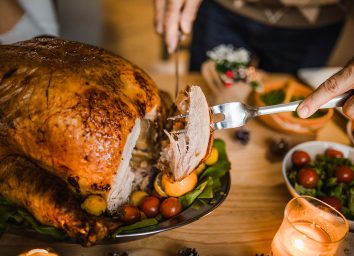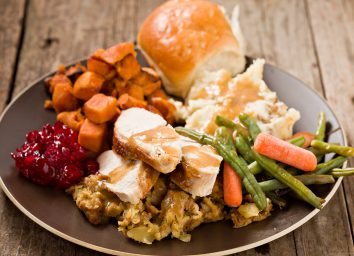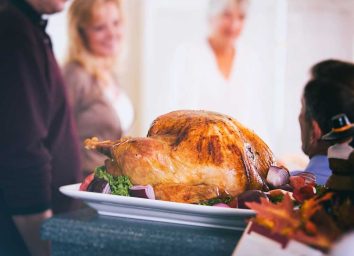8 Ways To Avoid The Dreaded Thanksgiving Food Coma

What would Thanksgiving be without the day of feasting? Whether your family serves its meal midday or later in the evening, you're likely expecting the classics: turkey, stuffing, mashed potatoes, buttery rolls, and of course, pie. The only problem? Overeating all this food not only leaves you with a food coma after enjoying it, but it can also leave you feeling groggy and gross.
Luckily, it doesn't have to be like that. We consulted registered dietitians to ask for their expert tips to avoid the dreaded Thanksgiving food coma that results in most of us falling asleep on the couch after the big meal.
What is a food coma?
There are a few theories as to what exactly causes induction of "food coma", or its scientific term of postprandial somnolence (after meal sleepiness).
One of which is the type of meal you eat, others include diversion of blood from other muscles to focus on digestion of the meal that was just consumed.
"Although there is no one exact cause that has been scientifically proven, physiology tells us the answer we are looking for may lay in the body's nervous system," says Kristi King, MPH, RDN, spokesperson for the Academy of Nutrition and Dietetics.
According to King, here's how it works. The nervous system has two main parts:
- the parasympathetic nervous system, which is known for our "rest and digest" mode and
- the sympathetic nervous system, which is used for stimulation ("fight or flight").
"When you consume a meal, especially a large meal, your parasympathetic nervous system function increases. This then decreases your sympathetic nervous system response, which equals a tired YOU!"
Another way to look at it: you've overwhelmed your body with the huge amount of food you just ate.
"Overeating can induce what feels like sluggishness and fatigue as blood is diverted away from the brain and extremities towards the gastrointestinal tract for digestion," says Monica Auslander Moreno, MS, RD, LD/N, registered dietitian and nutrition consultant for RSP Nutrition. "It can also happen as a result of a fall in blood sugar. After you eat, blood sugar rises, but after high refined flour/sugary meals, it can rapidly fall, and that decrease can also cause fatigue."
What can you do to avoid a food coma?
Read on for 8 tips to prevent you from feeling off after your Thanksgiving meal.
Fill your plate with color.
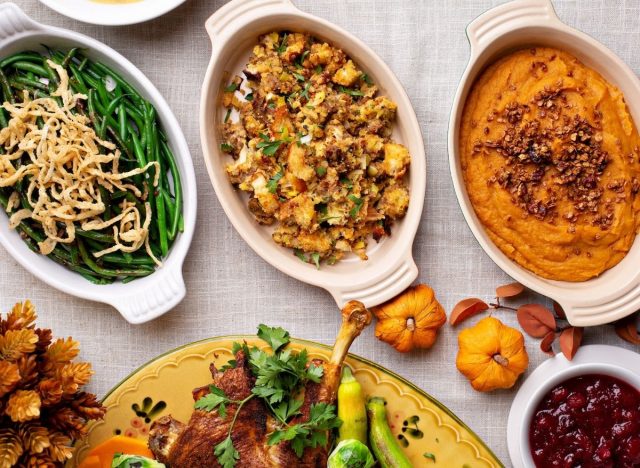
Your colorful foods are fruits and vegetables. "These provide fiber which helps to fill you up but also great antioxidants for overall health," says King. "Make half your plate fruits and vegetables. Try to avoid creamy vegetables, but if you can't resist, add just a spoonful to your plate."
Pace yourself throughout the day.

"Many people starve themselves on Thanksgiving to 'save up' for the big meal, but this is a recipe for a food coma. You're 100 percent going to overeat," says Auslander Moreno. She suggests you treat Thanksgiving like any other day, meal-wise. That means you need a full healthy breakfast and a full lunch, and even a pre-meal snack. (Or you WILL eat all 17 of the hors d'oeuvres at your host's house).
"You can have your (hopefully) nutrient-dense as usual breakfasts and lunches that have protein, plants, and fiber," says Auslander Moreno. "And if you're eating rather late, I oftentimes have a snack that has protein, like an apple with almond butter, on the way to the meal. This way, I can coast seamlessly while the turkey roasts for another three hours."
Eat mindfully.
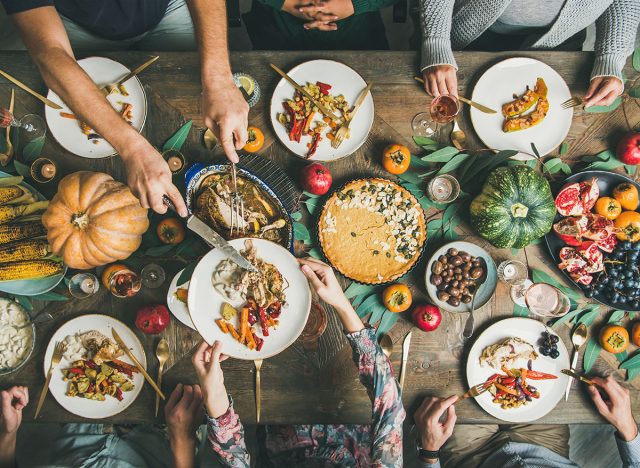
"This helps keep your portions in check and can prevent you from overeating higher fat foods," says King. "Ask yourself on a scale of 1-10, how hungry are you? Focus on the foods you are eating, savor the taste, aroma, and texture."
Eat slowly.
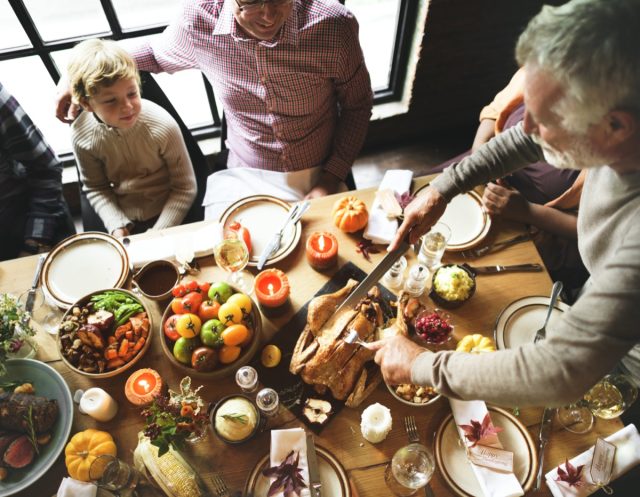
Try putting your fork down in between bites to pace yourself. "Reassure yourself that you don't need to clean your plate at the table, it's okay to not finish everything on your plate," says King.
Skip the dessert marathon.
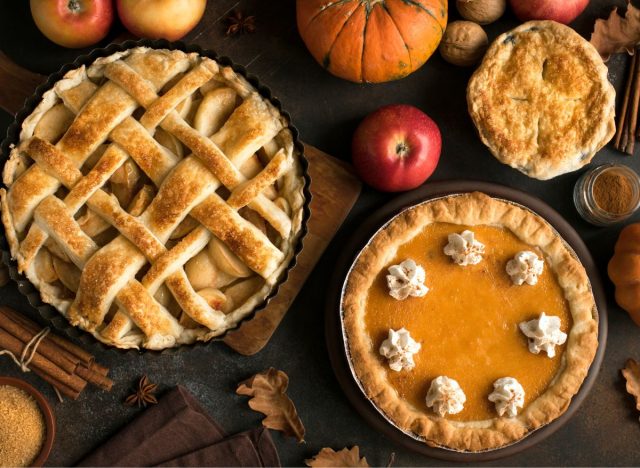
"Since a rapid rise and decrease in blood sugar can cause fatigue, stick to your one or two favorite desserts of moderate size, and pair them with some protein (like milk or yogurt) to slow down the glycemic response," says Auslander Moreno. "The dessert spread is certainly a marvel, but in reality, be honest with yourself and choose the one to two Thanksgiving desserts that you love the most. Take the rest home and freeze."
Drink plenty of water.

Do this before and during the meal. "When you are dehydrated your body can become sluggish and tired as well," says King. "[Being] dehydrated will only contribute to your food coma."
Go for a post-meal walk.

"This will help redistribute blood flow to the rest of your body and energize you," says Auslander Moreno. "Just get one foot in front of the other! Engage the whole family—everyone should enjoy a nice bonding event outdoors, take the dogs, and some tea."
Stick with one plate.
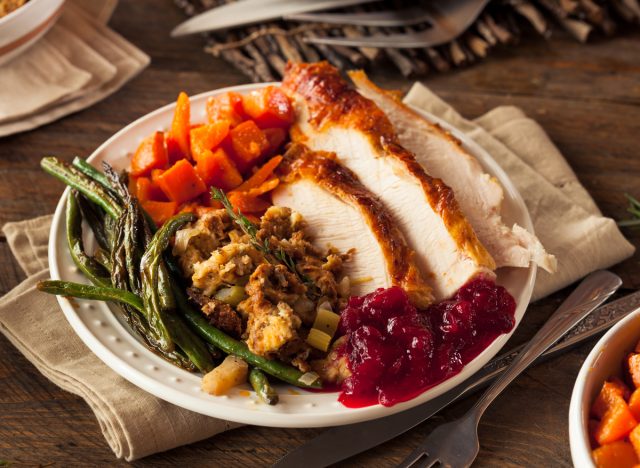
"It's best to prevent them in the first place by pacing yourself throughout the day and avoiding second (or third) helpings at meals," says Auslander Moreno. "One plate is enough. Your eyes are bigger than your stomach."
More Thanksgiving tips:
20 Thanksgiving Dishes You Can Make Without A Stove
